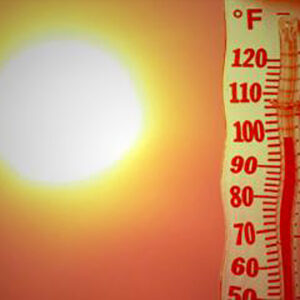
Joint News Release - In the Face of Excessive heat, Partners Join Forces to Protect Public Health, Safety
SPOKANE, Wash. – Local health and safety experts are reminding people hot weather can be more than just uncomfortable—it can pose a threat to people and pets’ health and lives. Partners are joining forces to underscore all the resources available in the community to help people stay safe and healthy in the face of excessive heat.
National Weather Service Spokane (NWS Spokane) predicts 'High Risk' heat for much of the population late this week, especially Thursday, when temperatures are expected to reach the mid-100s. This high-risk heat can be especially problematic for those who are heat sensitive and those without effective cooling and/or adequate hydration.
“Stay safe and healthy during hot weather. Know the signs of heat-related illness and the simple things you can do—like staying hydrated—to reduce your risk,” says Spokane Regional Health District health officer Dr. Bob Lutz.
Children and seniors, the homeless, people with chronic illnesses, and people who take certain medications, such as blood pressure medications and even antihistamines, are especially at risk for problems with high summer temperatures.
Additionally, the health district offers community organizers and others who are hosting outdoor events this guidance to consider for cancelling events or moving events indoors.
The City of Spokane Parks and Recreation Department proactively took steps to move its outdoor activities indoors or to cancel them as a result of forecasted high heat on Thursday. Additionally, Parks also is also monitoring air quality and may cancel or move outdoor activities because of air quality concerns. When the air quality index rises above 150, Parks makes modifications to its activities. Program participants and parents will be notified of any activities that are cancelled. The health district also offers Guidance for Air Pollution and School Activities/Outdoor Sport Events on its site.
Pools and splash pads can be a great, no-cost way for the community to cool down. Pools are open on Thursday and Friday, as long as air quality levels allow it. People can call the aquatics hotline at 509.625.6960 to determine if the pools are open. Here is more information on the City’s aquatics program and splash pads.
Those who are experiencing homelessness can get relief from the heat in the City’s 24/7 shelter system. House of Charity is open for adults. Women’s Hearth is open during the day for women, and Hope House is open at night. Crosswalk is open for teens. The City’s resource guide for these services is found on the City’s web site.
The City’s six public libraries also are open from 10 a.m. to 6 p.m. on Thursday and Friday and provide an air-conditioned space for citizens.
“We want to encourage our citizens to take advantage of the locations provided to help them stay cool during this period of extremely hot weather,” says Spokane Mayor David Condon. “And we ask people to check on their more vulnerable neighbors who might not have air conditioning.”
During periods of intense summer heat, communities naturally experience increased usage of air conditioners, which can overload the power grid and result in outages. Avista recommends these steps for individuals to help reduce strain and stay cool:
- Consider closing drapes during the day to help prevent home from getting too warm. Even better, use drapes with a light-colored backing, as lighter colors reflect more light, keeping your house even cooler.
- In the evening, do the opposite. Open drapes and windows to provide natural cooling.
- Hang wet laundry on a clothesline or drying rack, or outside on hangers.
- Turn air-conditioning off when not needed (early morning and late evening) and use box fans instead.
- Use heat producing appliances such as dishwashers, ovens, ranges, and dryers after 7:00 p.m., if possible.
- Use small electric appliances or a microwave for cooking instead of your stove or oven.
Avista also offers a page dedicated to preparing for outages, including an outage prep to-do list and safety checklist. Individuals can also download the Avista outage app for real-time information on mobile devices.
Also, in response to dry, hot summer conditions and high wildfire danger, Avista is undertaking temporary changes to power line operations in its Washington and Idaho service area. Line personnel are currently manually patrolling any outage areas before a line is placed back into service to decrease the potential that an automatically re-energized line starts a fire.
Avista will return the distribution system to normal as soon as weather permits. Avista appreciates the patience and understanding of its customers during this time.
Finally, a reminder that the temperature inside a parked car can reach more than 120 degrees in as little as 10 minutes. Direct sunlight and dark-colored interiors further speed the process. Children and animals should never be left in a parked car, even for a few minutes and even with the windows open. Lock parked cars to prevent children from playing in them.
For more information about avoiding heat-related illness, see the health district’s dedicated page here. More information can also be found at www.srhd.org, on Facebook or Twitter @spokanehealth.
